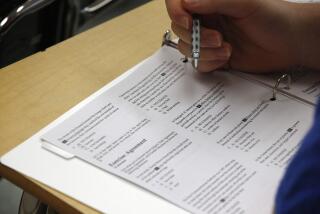A fair way to test special ed students
George Skelton provides a well-thought-out report of the challenges facing teachers and special education students in his Sept. 15 column, “Testing of special ed students should be re-examined.” As a high school special education teacher, I have a deep concern for my students who take the California high school exit examination. I am not sure that another government study is in order or another piece of legislation needs to be passed to address this issue and open wider doors for our special-needs students to complete high school.
I have kept track of my students for the last few years and noted their scores on the exit exam with more than a little consternation. What I have found (and I’m sure a broader data collection could be made in many school districts) is that a majority of my special-needs students who fail the exit exam (and that is a majority of my caseload in many years) do so by only 20 to 30 points. Students must score at least 350 points on both the language arts and mathematics portions of the exam to pass; many of my students score between 320 and 330 on these sections.
Skelton writes that we should use “common sense” in approaching this problem. Special-needs students have testing and classroom accommodations written into their Individual Education Plans; these are followed as an academic prescription to give students the greatest access to curriculum available in the least restrictive environment (this conforms to the Americans with Disabilities Act and the Individuals with Disabilities Educational Act). But even with full access, they are still disabled.
We can all agree that full access -- whether wheelchair ramps on street corners or classroom academic accommodations -- guarantees some kind of access, but it does not fully level the playing field. Nothing can truly guarantee that a person in a wheelchair will ever be able to play pro basketball in the NBA, although that may happen some day. No academic accommodation will guarantee that a young person with a learning disability will be able to attend Harvard Law School -- although this has happened in the past (which is a testament to the determination of those with academic disabilities).
The simple solutions are the best. The state Department of Education need only investigate the average exit exam score within the learning-disabled community and allow that to become the passing score for special-needs students, so long as the average score isn’t too low. Under such a system, special-needs students would still be accountable for their learning, would not receive a “free pass” and, most important, would be given a real chance to earn their diplomas.
Dennis Bass is a teacher at Bloomington High School in Bloomington, Calif.
More to Read
A cure for the common opinion
Get thought-provoking perspectives with our weekly newsletter.
You may occasionally receive promotional content from the Los Angeles Times.





